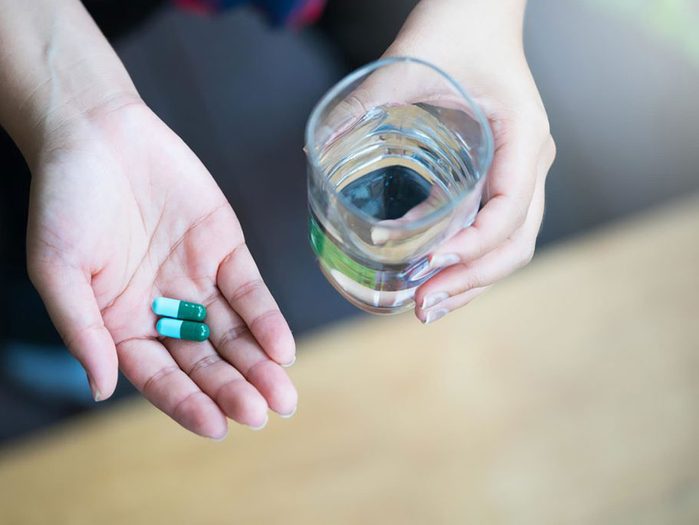
Take them with food
It’s no secret that you should always take your vitamins at mealtimes. “When you consume foods, it initiates a cascade of digestive processes that help absorb the nutrients from food, and this will also optimize the absorption of the vitamins and minerals,” explains naturopathic physician Duffy MacKay, ND, senior vice president of scientific and regulatory affairs for the dietary supplement industry group Council for Responsible Nutrition. There’s another reason too: “Taking vitamins and minerals with food helps to prevent nausea which some people may experience from supplements.”
Of course, there are exceptions to every rule—and in this case, it’s iron. Take it in the AM and on an empty stomach, advises psychologist and sleep expert Michael J. Breus, PhD, author of The Power of When. (Just be prepared: Iron on an empty stomach can trigger nausea.) Try consuming it with vitamin C-rich food, because vitamin C can increase iron absorption.

Learn how they work with your other meds
Don’t ignore other pills you may be taking, because as MacKay warns, vitamins and minerals can interact with prescription and over-the-counter meds. In some cases, this will make one or the other less effective. But in other cases, it could amplify their effects and put you at risk for an overdose. For example, calcium may interfere with the absorption of a commonly prescribed thyroid medication, and many women take both. “They compete for absorption in the blood stream and should be taken a few hours apart,” MacKay says. (Psst: You might want to talk to your doctor before taking supplements.)

Get schooled on fat- versus water-soluble vitamins
Knowing the difference between fat and water solubles will help you get the most out of your vitamins. Fat-soluble vitamins—namely A, D, E, and K—are stored in the body, where they can accumulate and in some cases, cause harm. By contrast, water-soluble vitamins such as the B vitamins—folate, thiamine, riboflavin, niacin, pantothenic acid, biotin, vitamin B6, and vitamin B12—and vitamin C, are excreted in the urine so they can’t build up in the body like their fat-soluble counterparts, explains Chris D’Adamo, PhD, director of research at the University of Maryland Center for Integrative Medicine in Baltimore. “This is the reason our urine is brightly coloured after we take certain water-soluble vitamins.”

Eat fat with fat-soluble vitamins
Fat-soluble vitamins tend to be better absorbed when eaten with fat. “And the morning would make sense if you drink milk, eat yogurt, or put avocado in your AM smoothie,” adds Dr. Breus. How much of a boost are we really talking about? It varies by vitamin, but a 2015 study found that men who took vitamin D with a high-fat breakfast had 32 percent greater absorption of the vitamin than those who ate a fat-free morning meal.

Consider both form and function
Magnesium is one of the most underrated minerals, and many of us don’t get enough of it. The problem may be how you take your magnesium supplements, as certain minerals—including magnesium—may be easier to digest and absorb and less likely to degrade when taken in liquid form. “If a vitamin is taken as tablet or capsule, your body has to break it up to dissolve it, but when consumed as a liquid, you can bypass that step,” MacKay says. That said, most forms of vitamins are created equally. “The choices are more about preferences, as some people can’t swallow these giant pills,” he says.

Know when to pair
Some vitamins and minerals are better together, D’Adamo says. This includes vitamin D, Vitamin K, and calcium. Vitamins D and K help the body and bones absorb calcium, so taking them together is one of many simple ways to boost your bones. Other winning combos include iron and vitamin C, as Vitamin C helps the body release a higher percentage of iron. “In a study we did, taking iron with vitamin C reduced side effects seen with iron such as constipation and nausea and boosted absorption,” says D’Adamo. A lot of times vitamins that go better together are packaged together, he says, but it pays to look for those combos.

Know when to split
Some vitamins and minerals are best when taken separately. “Zinc and copper compete with one another, as do iron and zinc when they are out of ratio, but multivitamins keep it balanced,” D’Adamo says. Calcium also inhibits iron, which means they should be separated, Breus adds. “The good news is that calcium can have a generally calming effect on many people and is unlikely to upset your stomach, therefore you should take iron in the AM, and calcium in the PM.”
Splitting pills can also make sense with some water-soluble vitamins, Breus says. “If a vitamin is water soluble, then you will urinate much of it out on your next bathroom trip, so some will need to be taken more than one time per day.” This is often good call when it comes to vitamin C, he says. Plus, learn the vitamin secrets doctors tell their friends.

Be careful with grapefruit juice
Danger! Grapefruit and certain medications don’t mix, according to the Food and Drug Administration. Grapefruit juice not only increases the potency of some substances in the body, but it also interferes with the absorption of other supplements such as St. John’s Wort, which is widely used to treat mild to moderate depression. It’s worth checking out whether any of your vitamins and minerals interact with grapefruit juice.

Get screened
One of the best ways to see if you’re getting enough of some important vitamins and nutrients is to get a blood test. It won’t give you a complete picture, but it can accurately detect levels of vitamin D as well as iron in your blood and let you know whether you need more or less. It’s a good idea to consider your family health history, so you can look into vitamins that might help prevent certain diseases that may run in your family such as folate malabsorbtion disorder, which interferes with the body’s ability to absorb certain B vitamins or folate from food, MacKay says. (Note: Vegans are more likely to be deficient in these nutrients.)

Look into digestive enzymes or probiotics
Do you need probiotics? You might. Probiotics are pretty popular these days, and their use is on the rise, according to a study in JAMA. “Probiotics help change the balance of good and bad bacteria that can get thrown off in certain health conditions,” D’Adamo says. And they may also make our vitamins more effective. “They do help us digest and assimilate nutrients better,” he says. Same goes for digestive enzymes. “There haven’t been a lot of studies, but we do know that plant-based digestive enzymes tend to survive stomach acid better, so they can help with absorption of certain nutrients that may normally get destroyed by the acid,” says D’Adamo. Essentially, plant-based digestive enzymes encourage the chemical breakdown of food into smaller more absorbable pieces. People with food intolerances who can’t break down certain foods and nutrients (like lactose in dairy), find them particularly helpful.

Know how and where to store your stash
Where and how you store vitamins and supplements can also affect their potency. “Probiotics should be shipped and stored cold in the refrigerator,” D’Adamo says. They contain live cultures, so if they’re not shipped cold, they’ll be dead on arrival as a result. Omega-3 fatty fish oil, another best-selling supplement, should be kept in a cold, dark spot, as the pills are at risk for degradation from heat, light, and oxygen. (If you tend to experience smelly fish burps from these supplements, store them in the freezer so they bypass the stomach entirely, D’Adamo advises.)

Go natural
Vitamin E is loaded with health benefits, and natural forms are twice as bioavailable as synthetic ones, D’Adamo says, which means your body can use more of the good stuff the capsules contain. How can you tell if you are taking natural C? “It would have a D on the label, while DL means synthetic,” he says. Vitamin E is the generic name for tocopherol, which is one type of the vitamin. “There are eight forms of Vitamin E, and your best bet is to pick ‘mixed tocopherols’ with a D on the label, as you get a better balance of the different types out there that are also more bioavailable,” he says.

Time them right
There are different rules for different vitamins and minerals when it comes to the best time to take them. “All B Vitamins should be taken in the morning, as they tend to give people energy,” Dr. Breus says. While most vitamins are taken first thing in the AM, others should be reserved for evenings largely because, some supplements may make you feel sleepy. This includes melatonin and valerian root. “Magnesium has a true calming effect, and in some cases it can make people feel downright sleepy, so it is best taken just before bed,” adds Dr. Breus.

Watch your caffeine intake
Caffeine in your morning joe may interfere with the absorption of vitamins and minerals—and as a diuretic, it also makes us pee more, speeding the rate at which we excrete water-soluble vitamins. Minimize these risks by consuming moderate amounts of caffeine and making sure you’re getting enough calcium and vitamin D.
Medically reviewed by Michael Spertus, MD.
Now that you’ve read up on how to increase vitamin absorption, next learn what supplements can help calm anxiety.
